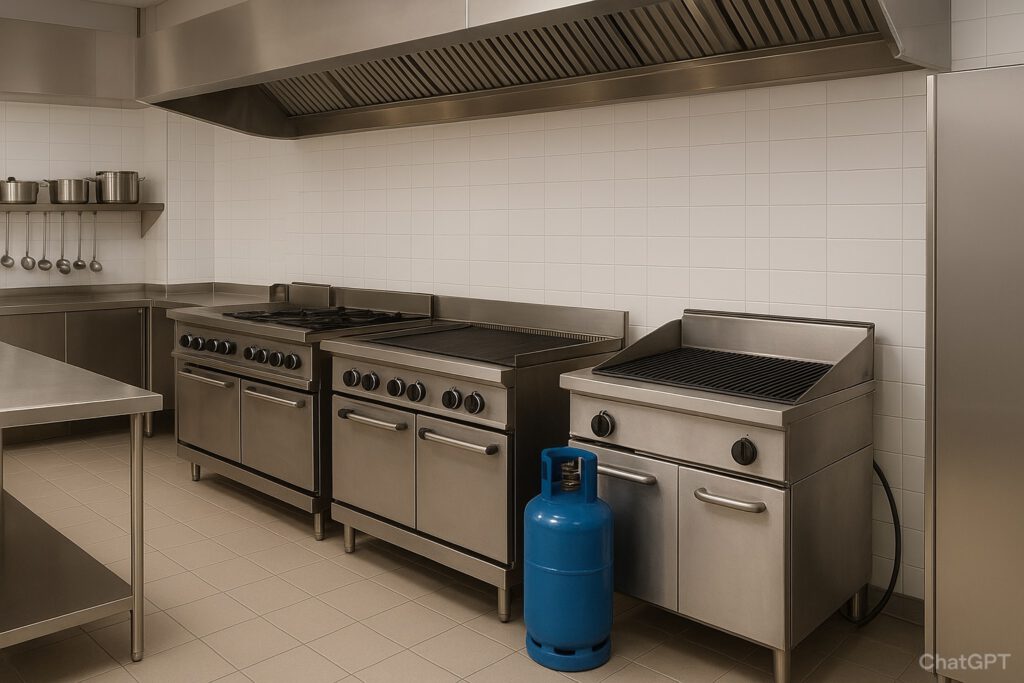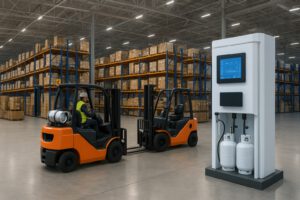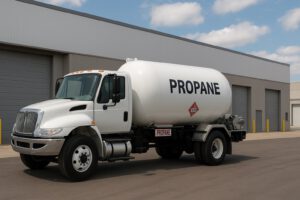
The hospitality industry demands reliable, high-performance energy solutions that ensure consistent cooking results, comfortable guest experiences, and operational efficiency. Propane-powered systems deliver the precision and reliability that restaurants, hotels, and resorts require for exceptional service quality.
Understanding propane applications in commercial kitchens, guest room heating, and outdoor hospitality spaces helps hospitality operators optimize energy costs while maintaining the highest standards of guest comfort and culinary excellence.
Commercial Kitchen Cooking Solutions
Propane-powered commercial kitchens offer superior performance for demanding food service operations, providing the consistent heat and precise control required for professional cooking.
Commercial Ranges and Cooktops
Heavy-duty propane ranges form the backbone of commercial kitchen operations, delivering the power and reliability needed for high-volume cooking.
Restaurant Ranges
- Heavy-duty construction: Stainless steel build for durability
- Multiple burners: 4-8 burner configurations for versatile cooking
- High BTU output: 25,000-35,000 BTU per burner for rapid heating
- Even heat distribution: Consistent cooking across all burners
Specialty Cooking Equipment
- Griddles and grills: Flat-top cooking surfaces for breakfast and grilling
- Fryers and ovens: Dedicated appliances for specific cooking methods
- Charbroilers: High-heat grilling for steaks and burgers
- Woks and specialty burners: Asian and international cuisine support
Commercial Ovens and Baking Equipment
Propane convection ovens and baking equipment ensure consistent results for commercial baking and roasting operations.
Convection Ovens
- Rapid heating: Quick preheat times for efficient operation
- Even baking: Consistent temperature distribution
- Multiple racks: High-volume baking capacity
- Programmable controls: Preset cooking cycles
Combination Ovens
- Steam and convection: Versatile cooking methods
- Energy efficient: Reduced cooking times and temperatures
- Holding capabilities: Keep food warm without overcooking
- Cleaning systems: Automated sanitation features
Food Service Heating and Holding
Propane systems maintain food quality and safety throughout the service cycle, from preparation to serving.
Food Warmers and Holding Equipment
Precise temperature control prevents bacterial growth while maintaining food quality and presentation.
Steam Tables and Hot Plates
- Consistent temperatures: Safe holding temperatures (135°F+)
- Moisture retention: Steam prevents food drying
- Energy efficient: Maintains heat with minimal fuel use
- Easy cleaning: Stainless steel construction
Proofing and Holding Cabinets
- Temperature control: Precise humidity and heat settings
- Capacity optimization: Maximize storage space
- Door designs: Easy access and visibility
- Digital controls: Programmable operation
Dishwashing and Sanitation
Commercial dishwashers and sanitizing equipment ensure hygienic operations and compliance with health standards.
Commercial Dishwashers
- High-temperature sanitizing: 180°F final rinse
- Rapid cycle times: Efficient operation during busy periods
- Water conservation: Low-flow designs reduce utility costs
- Energy recovery: Heat recovery systems
Guest Room and Facility Heating
Hotels and resorts rely on propane for comfortable, efficient heating that ensures guest satisfaction and energy cost management.
Central Heating Systems
Large hospitality facilities use propane boilers and furnaces for whole-building climate control.
Propane Boilers
- High efficiency ratings: 90%+ AFUE for cost savings
- Modular designs: Scalable capacity for different facility sizes
- Radiant heating: Comfortable, even heat distribution
- Domestic hot water: Combined heating and hot water systems
Rooftop Units
- Self-contained systems: Easy installation and maintenance
- Variable speed blowers: Quiet, efficient operation
- Smart controls: Integration with building management systems
- Weather protection: Durable construction for outdoor mounting
Guest Room Heating
Individual room heating provides personalized comfort while maintaining energy efficiency.
Wall Furnaces
- Direct-vent design: Safe indoor operation
- Thermostat control: Individual temperature settings
- Quiet operation: Minimal noise for guest comfort
- Decorative options: Attractive room integration
Space Heaters
- Supplemental heating: Additional warmth as needed
- Energy efficient: Only operate when required
- Safety features: Tip-over protection and auto shut-off
- Portable designs: Flexible room placement
Outdoor Hospitality Applications
Propane enhances outdoor hospitality spaces with reliable cooking and comfort features for year-round enjoyment.
Outdoor Kitchen and Dining
Patio kitchens and outdoor dining areas extend hospitality services beyond indoor spaces.
Outdoor Cooking Stations
- Built-in grills: Commercial-grade outdoor cooking
- Refrigeration units: Cold storage for outdoor service
- Preparation areas: Counter space for food staging
- Weather protection: Covered designs for all-season use
Pool and Recreation Areas
- Pool heating: Year-round swimming comfort
- Spa systems: Therapeutic hot water features
- Outdoor showers: Convenience and comfort amenities
- Landscaping lighting: Propane-powered illumination
Event and Catering Support
Large hospitality venues support special events with propane-powered equipment for exceptional experiences.
Temporary Cooking Facilities
- Mobile kitchens: Portable cooking for events
- Catering equipment: Field kitchens and serving stations
- Emergency backup: Reliable power for critical operations
- Scalable capacity: Adjust to event size requirements
Energy Efficiency and Cost Management
Propane systems offer superior efficiency and predictable costs for hospitality operations, optimizing both performance and profitability.
Operational Advantages
Propane’s characteristics make it ideal for demanding hospitality environments with variable usage patterns.
Performance Benefits
- Rapid response: Instant heat availability for peak demands
- Consistent output: Reliable performance during busy periods
- Clean operation: No soot or residue in commercial kitchens
- Storage stability: Long-term fuel storage without degradation
Cost Optimization
- Predictable pricing: Stable fuel costs for budgeting
- Volume discounts: Commercial pricing for large operations
- Energy rebates: Utility incentives for efficient equipment
- Maintenance savings: Reliable systems reduce repair costs
Smart Energy Management
Modern propane systems include advanced controls for optimal energy utilization in hospitality settings.
Automated Controls
- Demand-based operation: Adjust to occupancy and usage patterns
- Scheduling systems: Optimize operation for business hours
- Load management: Balance multiple appliances efficiently
- Remote monitoring: Energy usage tracking and optimization
Safety and Compliance Standards
Hospitality facilities must maintain the highest safety standards, and propane systems include comprehensive safety features and compliance measures.
Commercial Kitchen Safety
Multiple safety systems protect staff, guests, and property in commercial food service environments.
Gas Safety Features
- Automatic shut-off valves: Prevent gas flow during emergencies
- Leak detection systems: Continuous monitoring for gas leaks
- Pressure regulators: Maintain safe operating pressures
- Emergency ventilation: Exhaust systems for gas removal
Fire Prevention
- Flame failure protection: Automatic shutdown if flame extinguishes
- Grease extraction: Commercial exhaust and filtration systems
- Fire suppression: Integrated sprinkler and suppression systems
- Regular inspections: Professional safety maintenance
Regulatory Compliance
Hospitality operations must comply with multiple regulatory requirements for safe propane usage.
Building Codes
- NFPA standards: National fire protection requirements
- Local ordinances: Municipal safety regulations
- Health department: Food service sanitation requirements
- ADA compliance: Accessible equipment design
Insurance Requirements
- Equipment certification: Approved appliance installations
- Maintenance records: Regular inspection documentation
- Operator training: Certified staff operation
- Risk assessment: Comprehensive safety evaluations
Installation and Maintenance
Professional installation and ongoing maintenance ensure optimal performance and longevity of hospitality propane systems.
System Installation
Commercial propane installations require specialized expertise and coordination with facility operations.
Kitchen Installations
- Gas line infrastructure: Proper piping and manifold systems
- Ventilation systems: Commercial exhaust and makeup air
- Utility coordination: Integration with electrical and plumbing
- Equipment positioning: Optimal workflow and safety layout
Facility-Wide Systems
- Central plant design: Boiler and heating system installation
- Distribution networks: Piping throughout the facility
- Backup systems: Redundant equipment for reliability
- Monitoring integration: Building management system connection
Maintenance Programs
Regular maintenance ensures continued safety, efficiency, and reliability of propane hospitality systems.
Preventive Maintenance
- Quarterly inspections: Comprehensive system evaluations
- Annual certifications: Regulatory compliance verification
- Equipment cleaning: Burner and component maintenance
- Performance testing: Efficiency and safety verification
Emergency Services
- 24/7 support: Round-the-clock technical assistance
- Parts availability: Quick access to replacement components
- On-site repairs: Minimized downtime for critical systems
- Preventive planning: Seasonal maintenance scheduling
Economic Considerations
Hospitality operators must balance performance requirements with operational costs for profitable propane system investments.
Cost-Benefit Analysis
Propane systems offer compelling financial advantages for hospitality operations through efficiency and reliability.
Initial Investment
- Equipment costs: $10,000-$100,000+ per commercial kitchen
- Installation expenses: $5,000-$50,000 for professional setup
- Infrastructure upgrades: Ventilation and utility modifications
- Training programs: Staff education and certification
Operating Costs
- Fuel expenses: $0.80-$1.20 per gallon depending on volume
- Maintenance budgets: 2-3% of equipment value annually
- Utility savings: Reduced electricity costs
- Insurance premiums: Lower rates for certified systems
ROI and Financial Benefits
Propane hospitality systems deliver strong returns through operational efficiency and service quality improvements.
Revenue Enhancement
- Menu expansion: New cooking capabilities attract customers
- Service speed: Faster food preparation improves throughput
- Guest satisfaction: Reliable comfort and amenities
- Competitive advantage: Superior facilities differentiate offerings
Cost Savings
- Energy efficiency: Lower utility costs per guest or meal
- Equipment longevity: Reduced replacement frequency
- Labor optimization: More efficient kitchen operations
- Waste reduction: Precise cooking minimizes food waste
Future of Hospitality Propane Solutions
Emerging technologies continue to enhance propane applications in the hospitality industry with greater efficiency and guest experiences.
Innovation Trends
Advanced technologies are transforming hospitality propane systems for improved performance and sustainability.
Smart Technology Integration
- IoT connectivity: Remote monitoring and predictive maintenance
- AI optimization: Automated energy management systems
- Voice control: Hands-free equipment operation
- Mobile apps: Guest room climate control
Sustainable Solutions
- Renewable propane: Bio-based fuel integration
- Energy recovery: Waste heat utilization systems
- Emission reduction: Advanced clean-burning technologies
- Water conservation: Efficient appliance designs
Making the Right Choice
Selecting propane hospitality solutions requires evaluating operational needs, guest expectations, and facility requirements for optimal performance.
Assessment Factors
Several key considerations help determine the best propane solutions for hospitality operations.
- Operation type: Restaurant, hotel, resort, or mixed-use facility
- Capacity requirements: Peak demand and daily usage patterns
- Budget constraints: Investment level and financing options
- Energy costs: Local fuel pricing and utility rates
Implementation Strategy
Successful propane system adoption requires careful planning and professional execution.
Planning Phase
- Facility assessment: Evaluate current infrastructure and needs
- Vendor selection: Compare equipment options and service capabilities
- Regulatory compliance: Ensure all permits and approvals
- Staff training: Comprehensive operator education
Next Steps
- Consult specialists: Work with hospitality equipment experts
- Request demonstrations: Test equipment in operational environments
- Develop timeline: Create implementation schedule with minimal disruption
- Monitor performance: Track efficiency and guest satisfaction improvements
Propane hospitality solutions deliver the reliability, performance, and efficiency that modern hospitality operations demand. From commercial kitchens to guest comfort systems, propane technology ensures exceptional service quality and operational excellence in the competitive hospitality industry.
About Jennifer Whitaker
Propane industry expert and content contributor for MyPropane.com.
View all posts by Jennifer Whitaker →Related Articles

Propane Warehouse Operations and Tank Monitoring: Complete Guide
Sep 18, 2025 • 7 min read
Optimize warehouse operations with propane-powered forklifts, automated tank monitoring, and efficient fuel management. Learn about cylinder exchange programs and smart…

Bulk Propane Delivery for Businesses: Commercial Solutions
Sep 17, 2025 • 9 min read
Discover bulk propane delivery services for commercial and industrial applications. Learn about pricing, contracts, tank options, and delivery scheduling for…